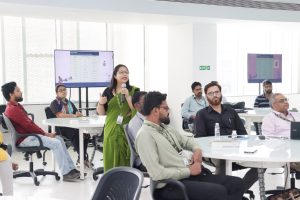All Management Events
- Blood Donation Camp at SRM University-AP: Hundreds of Blood Donors Joined in the Noble Gesture January 31, 2023
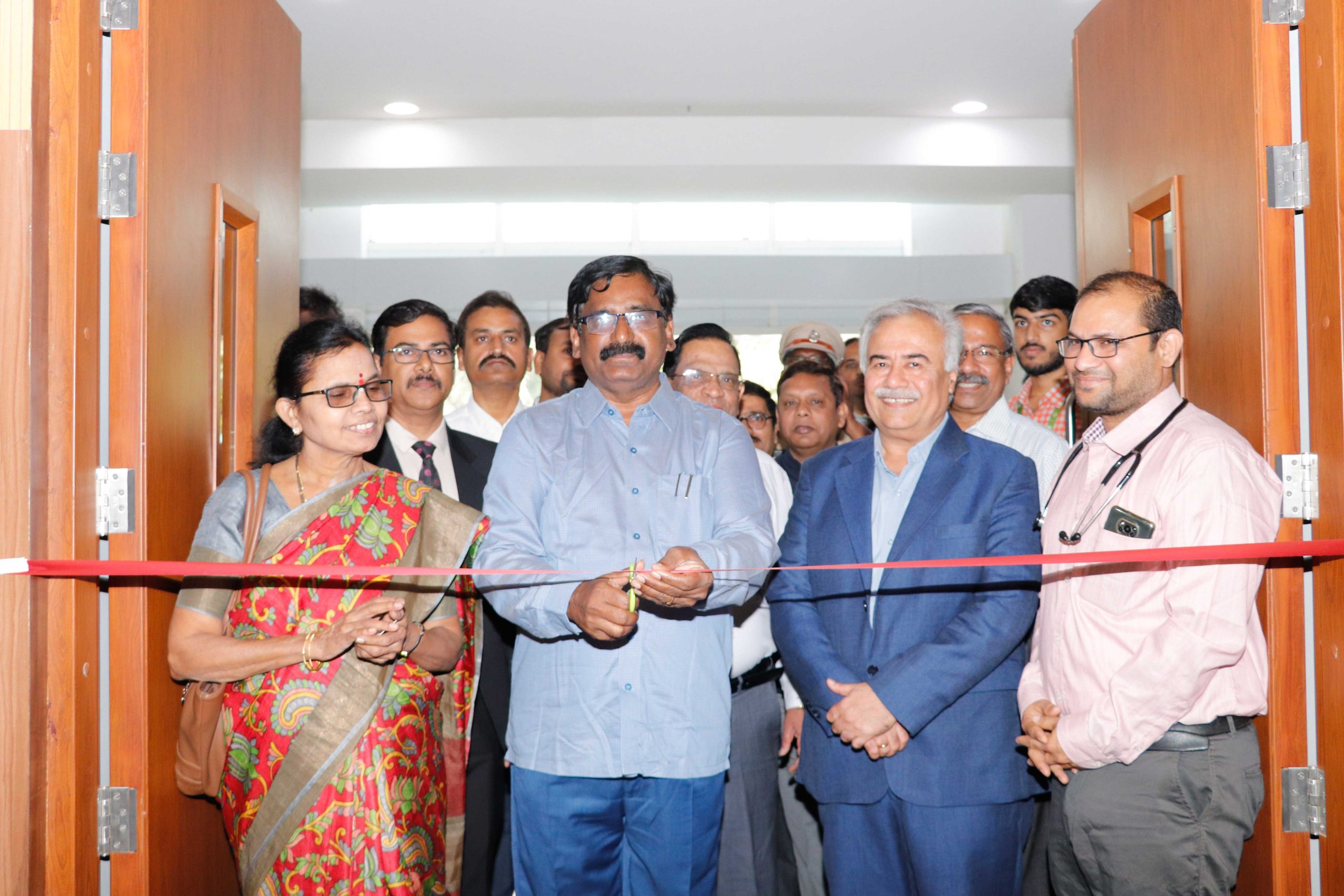 NSS Cell, Health Centre and the Directorate of Student Affairs of SRM University-AP, in Association with the Government Blood Bank, Guntur, conducted a Blood Donation Camp on Wednesday, January 25, 2023. Mr S K Kareem, Deputy Transport Commissioner, Guntur, was the Chief Guest of the programme. The Guest of Honour of the event was Dr Prabhavathi, Superintendent, Government General Hospital, Guntur. Over 100 students and faculty members donated their blood at the camp.
NSS Cell, Health Centre and the Directorate of Student Affairs of SRM University-AP, in Association with the Government Blood Bank, Guntur, conducted a Blood Donation Camp on Wednesday, January 25, 2023. Mr S K Kareem, Deputy Transport Commissioner, Guntur, was the Chief Guest of the programme. The Guest of Honour of the event was Dr Prabhavathi, Superintendent, Government General Hospital, Guntur. Over 100 students and faculty members donated their blood at the camp.The guests were welcomed to the university with mementoes and bouquets by the Vice Chancellor, Pro-Vice-Chancellor, and Registrar of SRM University-AP. Mr S K Kareem lauded the significance of blood donors at a time when road accident rates are exponentially increasing. He also requested the Vice Chancellor of SRM AP to organise a road safety awareness programme for the students. “Enrol yourself in blood donor groups and be willing to donate your blood from time to time”, said Dr Prabhavathi as she explained the different occasions where sufficient availability of blood is indispensable.
Continue reading →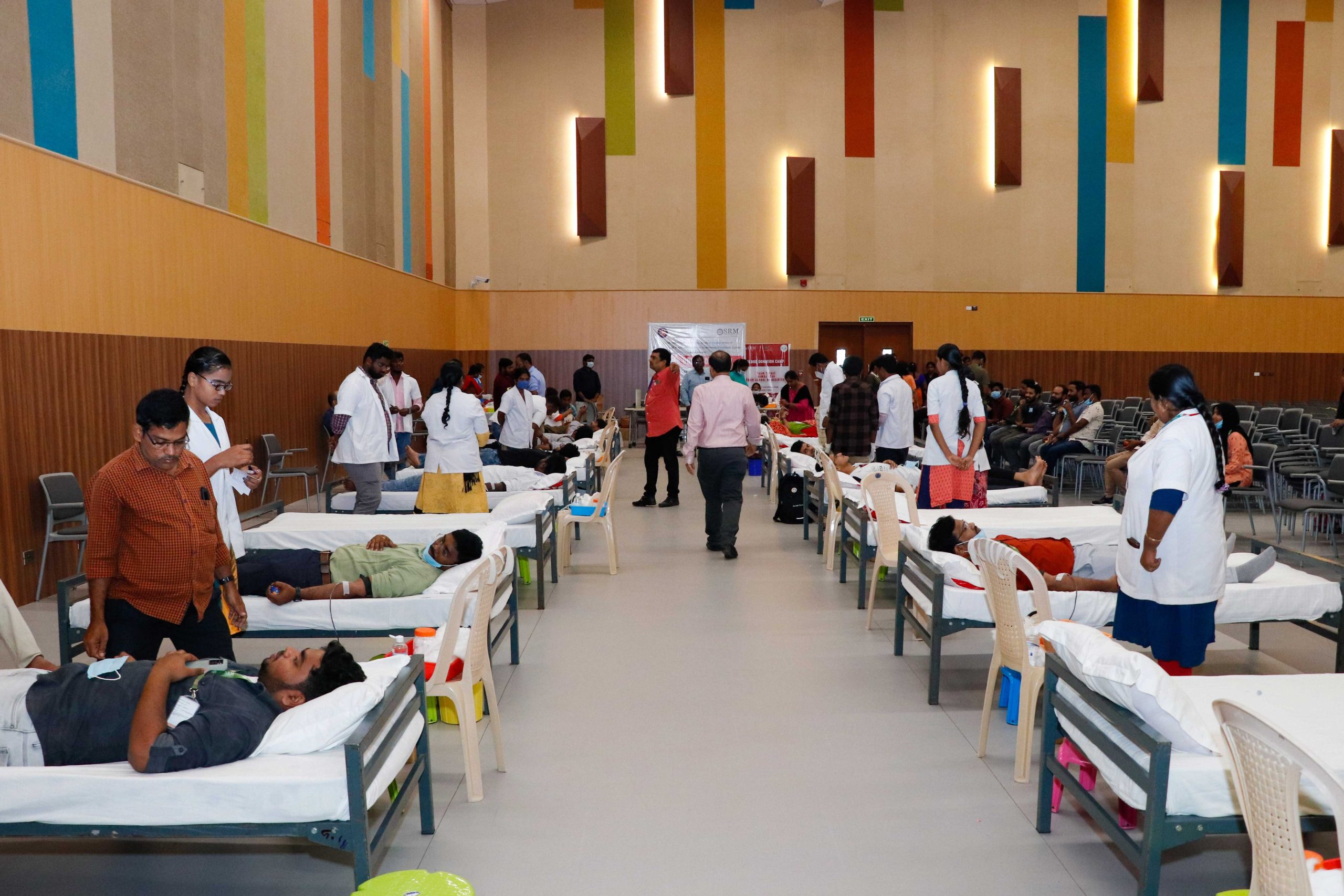 Vice Chancellor of SRM AP, Prof. Manoj K Arora, motivated students to donate blood and, in addition, to do some research in the area. He stressed the importance of ensuring that the donated blood is being utilised at the right place. Prof. D Narayana Rao, Pro-Vice-Chancellor of SRM AP, highlighted the need for regular blood donation and applauded all the blood donors. At the same time, he discussed how blood donation benefits both the donor and the receiver. Dr R Premkumar, Registrar of SRM AP; Mr Anil Kumar Nigam, Director of Student Affairs; Ms Revathy Balakrishnan, Assistant Director of Student Affairs; Dr Ch Lakshmi Rajyam, Medical Officer of SRM AP; and Dr A Lakshmana Rao, NSS Coordinator of SRM AP was also present at the occasion. Students of Samaj Seva, an initiative of the Paari School of Business at SRM AP, volunteered to assist with the blood donation camp.
Vice Chancellor of SRM AP, Prof. Manoj K Arora, motivated students to donate blood and, in addition, to do some research in the area. He stressed the importance of ensuring that the donated blood is being utilised at the right place. Prof. D Narayana Rao, Pro-Vice-Chancellor of SRM AP, highlighted the need for regular blood donation and applauded all the blood donors. At the same time, he discussed how blood donation benefits both the donor and the receiver. Dr R Premkumar, Registrar of SRM AP; Mr Anil Kumar Nigam, Director of Student Affairs; Ms Revathy Balakrishnan, Assistant Director of Student Affairs; Dr Ch Lakshmi Rajyam, Medical Officer of SRM AP; and Dr A Lakshmana Rao, NSS Coordinator of SRM AP was also present at the occasion. Students of Samaj Seva, an initiative of the Paari School of Business at SRM AP, volunteered to assist with the blood donation camp. - Dr Harish Puppala January 30, 2023
- Faculty Orientation Programme 2023 January 30, 2023
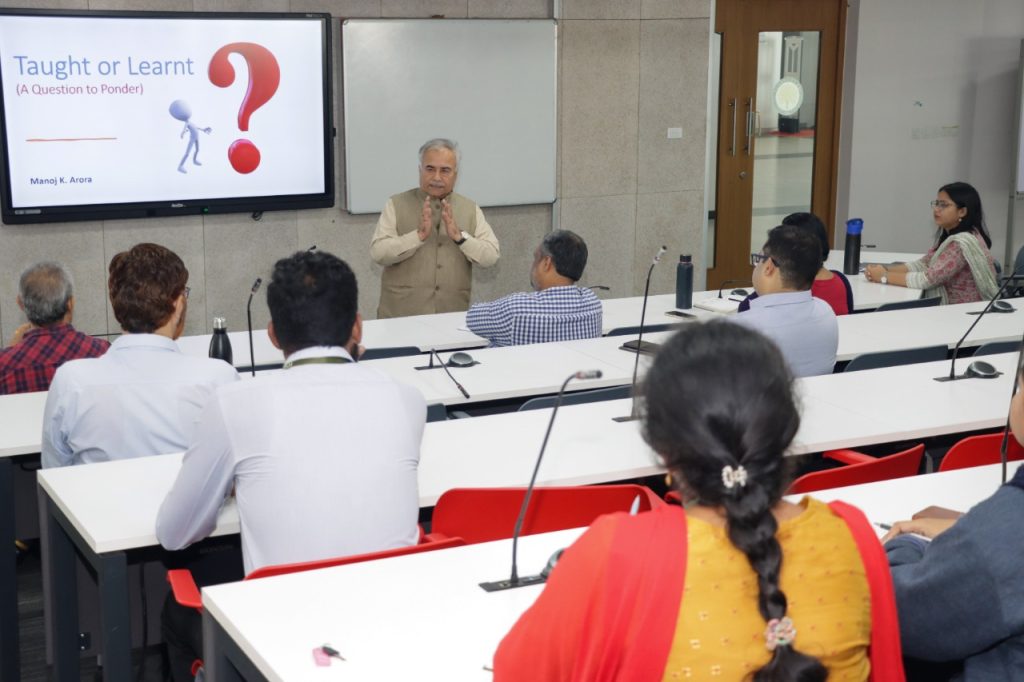
The Teaching Learning Centre at SRM University-AP conducted a 4-day face-to-face Faculty Orientation programme for the newly joined faculty members from January 17 – 20, 2023. Honourable Vice Chancellor, Prof. Manoj K Arora delivered an introductory talk expounding on the larger goals of the University. The programme aimed at seamlessly aligning faculty activities with the University’s ideology & philosophy.
The workshop included a series of hands-on sessions on Active Learning, Project Based Learning, Technology-enabled learning, Outcome-based learning, Curriculum design, development and delivery, new ways of assessments, Classroom communication and Student engagement facilitated by Dr Balaguruprasad N and Dr Anupama G, faculty members of the Teaching Learning Centre.
More than 50 new faculty members attended and benefited from the programme by working together in experiential activities, creating new lessons using innovative pedagogies and designing innovative assessments among other teaching-learning practices. The participating faculty members also benefited from the University student counsellor, Ms Liza Hazarika and Dr Veena Kumar from the University of Maryland, Global Campus.
Continue reading → - Dr Pratik Roy January 30, 2023
- Exploring the Potential of an Image Description Generator January 27, 2023
An Image caption generator system implies the detection of the image as well as producing the caption with natural language processing by the computer. This is a tedious job. Image caption generator systems can solve various problems, such as self-driving cars, aiding the blind, etc.
The recent research at the Department of Computer Science and Engineering proposes a model to generate the captions for an image using ResNet and Long Short-Term Memory. Assistant Professors Dr Morampudi Mahesh Kumar and Dr V Dinesh Reddy have published the paper Image Description Generator using Residual Neural Network and Long-Short-Term Memory in the Computer Science Journal of Moldova with an impact factor of 0.43.
The captions or descriptions for an image are generated from an inverse dictionary formed during the model’s training. Automatic image description generation is helpful in various fields like picture cataloguing, blind persons, social media, and various natural language processing applications.
Despite the numerous enhancements in image description generators, there is always a scope for development. Taking advantage of the larger unsupervised data or weakly supervised methods is a challenge to explore in this area, and this is already there among the future plan of the researchers. Another major challenge could be generating summaries or descriptions for short videos. This research work can also be extended to other sets of natural languages apart from English.
Abstract
Continue reading →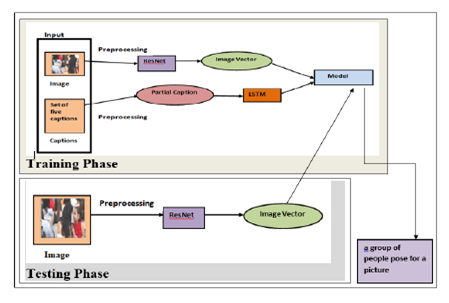 Human beings can describe scenarios and objects in a picture through vision easily, whereas performing the same task with a computer is a complicated one. Generating captions for the objects of an image helps everyone to understand the scenario of the image in a better way. Instinctively describing the content of an image requires the apprehension of computer vision as well as natural language processing. This task has gained huge popularity in the field of technology, and there is a lot of research work being carried out. Recent works have been successful in identifying objects in the image but are facing many challenges in generating captions to the given image accurately by understanding the scenario. To address this challenge, we propose a model to generate the caption for an image. Residual Neural Network (ResNet) is used to extract the features from an image. These features are converted into a vector of size 2048. The caption generation for the image is obtained with Long Short-Term Memory (LSTM). The proposed model was experimented with on the Flickr8K dataset and obtained an accuracy of 88.4%. The experimental results indicate that our model produces appropriate captions compared to the state of art models.
Human beings can describe scenarios and objects in a picture through vision easily, whereas performing the same task with a computer is a complicated one. Generating captions for the objects of an image helps everyone to understand the scenario of the image in a better way. Instinctively describing the content of an image requires the apprehension of computer vision as well as natural language processing. This task has gained huge popularity in the field of technology, and there is a lot of research work being carried out. Recent works have been successful in identifying objects in the image but are facing many challenges in generating captions to the given image accurately by understanding the scenario. To address this challenge, we propose a model to generate the caption for an image. Residual Neural Network (ResNet) is used to extract the features from an image. These features are converted into a vector of size 2048. The caption generation for the image is obtained with Long Short-Term Memory (LSTM). The proposed model was experimented with on the Flickr8K dataset and obtained an accuracy of 88.4%. The experimental results indicate that our model produces appropriate captions compared to the state of art models. - Reservation for Communities in Sikkim: Examining the Political Demand January 27, 2023
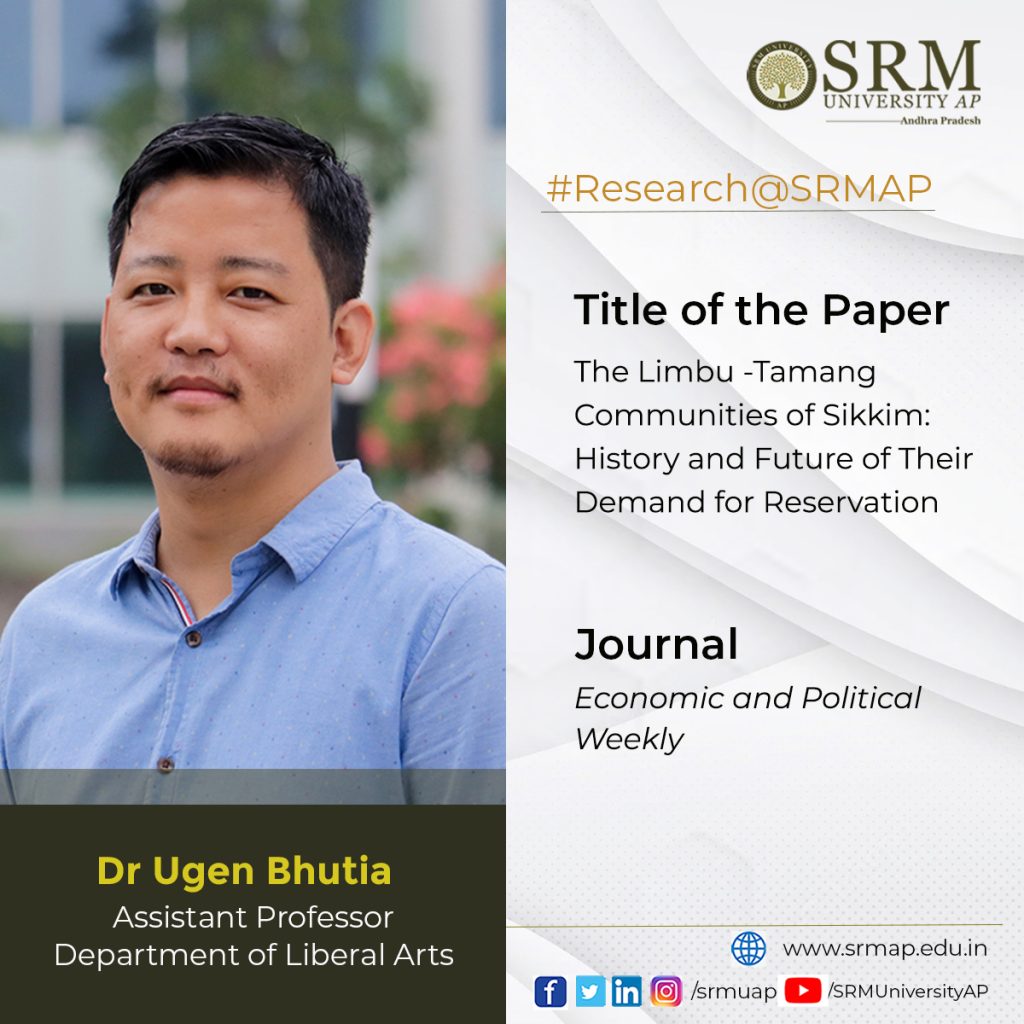 It is a prerequisite for a country like India showcasing vast cultural, social, political and economic diversity, for adopting an unprejudiced reservation system to ensure equal and just representation of varied communities in the political decision-making process of the country. But many communities that have been historically disadvantageous(SC/ST) still struggle to receive their right to representation. Dr Ugen Bhutia, Assistant Professor, Department of Liberal Arts, has published a paper titled “The Limbu–Tamang Communities of Sikkim History and Future of Their Demand for Reservation” in the Journal Economic and Political Weekly. The paper provides a comprehensive outlook on the complex history of the communities in Sikkim and past events that have cumulated in their demand for representation in the democratic polity of the country. The future direction of the demand for reservation and its prospective outcomes have also been emulated.
It is a prerequisite for a country like India showcasing vast cultural, social, political and economic diversity, for adopting an unprejudiced reservation system to ensure equal and just representation of varied communities in the political decision-making process of the country. But many communities that have been historically disadvantageous(SC/ST) still struggle to receive their right to representation. Dr Ugen Bhutia, Assistant Professor, Department of Liberal Arts, has published a paper titled “The Limbu–Tamang Communities of Sikkim History and Future of Their Demand for Reservation” in the Journal Economic and Political Weekly. The paper provides a comprehensive outlook on the complex history of the communities in Sikkim and past events that have cumulated in their demand for representation in the democratic polity of the country. The future direction of the demand for reservation and its prospective outcomes have also been emulated.Abstract
Since its merger in 1975 with the Indian union, one of the major sociopolitical issues in Sikkim has been the demand for reservation in the state legislative assembly for two communities—Limbu and Tamang. The demand of reservation for the Limbus and Tamangs crystallised in Sikkim when these communities were notified as Scheduled Tribes under the Scheduled Castes and Scheduled Tribes Orders (Amendment) Act, 2002. The history and future of this political demand has been analysed.
Continue reading → - Pursuing Your Dream Career: Gaining an MTech Degree and What to Expect January 26, 2023

Have you always wanted to pursue a career in a specialised field? Are you considering getting an MTech degree?
If so, you’re not alone! Many people are looking to specialise in a particular field, and an MTech degree is one way to do it. This blog post will discuss what it takes to pursue an MTech degree and what to expect from this journey
Why an MTech Degree?
Benefits of Pursuing the Most Sought After Career Option
- Knowledge and Expertise in Technical Subjects
An MTech degree offers an in-depth study of a specific technical subject, allowing you to become an expert in your field. By doing MTech, you not only get knowledge about a particular area but also develop strong communication, problem-solving and analytical skills. You become eligible to work in industry and research fields that require technical expertise.
- Successful Career Prospects
With an MTech degree, one can expect better job prospects and salary packages than with other degrees. It also provides the opportunity to learn highly advanced technologies and equip yourself for a successful career in technology-based organisations. With an MTech degree, one can increase job marketability and become more attractive to potential employers.
- Gateway to Higher Studies and Research
An MTech degree opens the door to further studies or research and may lead to better job opportunities. It is an excellent way for those interested in technology to gain knowledge and better understand the field.
- Specialisations in Your Area of Interest
Aside from this, MTech can also allow students to specialise in a particular area or branch of technology and gain expertise. Moreover, it also opens the door to further research opportunities and postgraduate studies.
- Stay Ahead of the Curve
Studying MTech can be highly beneficial for those looking to advance their career or pursue academic goals in the technology field. With an MTech degree, you can stay up to date with the latest technologies and gain valuable knowledge that will benefit your career and personal life. You can stay ahead of the curve and keep up with the rapidly changing technology industry.
Are you looking for a promising MTech Programme?

The Large Umbrella of MTech Programmes
An MTech degree offers a specialised and advanced education that can give graduates an edge in the job market.
- Materials and Manufacturing MTech Programmes
Materials and Manufacturing MTech programmes provide a deep understanding of Materials Science, Materials Engineering, and Manufacturing processes, which can be applied to a wide range of industries.
Graduates with a Materials and Manufacturing MTech degree can access rewarding and well-paying positions in areas such as,
-
- Aerospace engineering
- Automotive engineering
- Biomedical engineering
– that require expertise in materials and manufacturing technology.
The practical knowledge gained from Materials and Manufacturing MTech studies can help develop new materials for use in production pipelines or create innovative manufacturing processes that streamline production times whilst improving quality control, making the Materials and Manufacturing MTech degree beneficial to the individual graduate and employers alike.
- Surplus Opportunities to Work on Research Projects
Pursuing an MTech degree provides opportunities to work on research projects, which can create networking opportunities and help you hone your skills.
For example, Thermal MTech students get to explore the fascinating field of Thermal engineering, such as Thermal design and Thermal analysis.
They also get to work on projects related to,
-
- Thermal energy management
- Thermal systems design
- Thermal control systems.
- The Bright Side of Thermal Engineering
Working on research projects in Thermal engineering can also give students an edge in the industry as it enhances their understanding of Thermal principles and technologies.
Valuable industry experience and essential connections in the Thermal engineering field through their research work.
All these advantages make pursuing an MTech degree worthwhile for those interested in Thermal engineering.
MTech provides invaluable insight into the latest breakthroughs and technologies in your field, helping you stay ahead of the curve.
Studying for an MTech can provide immense advantages for those in the technological field, particularly IoT technologies. Not only does it offer the opportunity to gain higher qualifications and broaden skills, but it can also provide invaluable insight into the latest IoT breakthroughs and technologies, helping students stay ahead of the curve.
- The Perks of an MTech in VLSI
An MTech in VLSI will allow you to develop advanced knowledge and skills, making a VLSI engineer highly sought after in many industries. As a VLSI engineer, you can work with hardware design, device fabrication, circuit design and debugging, amongst other skills, which will give you a competitive edge over other job applicants.
- Possibilities of the Internet of Things (IoT)

IoT (Internet of Things) related coursework provides students with comprehensive technical and practical insight into IoT systems development. Technical topics like IoT architecture, IoT standards and IoT security are taught in detail, enabling those who complete the program to gain specialised knowledge in the IoT domain.
Furthermore, the programme also typically offers a research-based thesis which enables students to apply their IOT skills to real-world problems. In this way, MTech programmes provide an excellent opportunity for students to understand IoT systems and technologies deeply.
What to Expect From an MTech Degree?
-
- Opportunity to develop their professional skills through hands-on projects and internships
- Opportunity to become experts in Data Science and its associated technologies.
- Data Science is a rapidly evolving field, and an MTech will provide the guidance needed to stay current and be at the forefront of Data Science development.
- Provides students with the ability to gain a deeper understanding of Data Science and its applications, which can help them get better jobs or progress their careers.
Where Will You Be After graduation?
Upon graduation, MTech graduates are highly sought after in the job market, with many top companies offering competitive salaries for those with an MTech degree.
Furthermore, an MTech degree is a tremendous advantage as Thermal graduates are highly sought after in the job market.
Thermal graduates have specialised knowledge, making them more attractive to companies and often offered competitive salaries.
An MTech degree provides Thermal graduates with unique skills and qualifications that make them stand out in the job market and ensure they have a competitive advantage over other applicants.
Making the Most of Your MTech Degree; Yes That’s What Makes the difference!
With an MTech degree, you can pursue a plethora of career options.
What are the Most Coveted Career Options After MTech?
-
-
- Engineering
- Research and development
- Data science
- Materials and Manufacturing
-
- The Scope of Materials and Manufacturing
Materials and Manufacturing are two areas often explored in an MTech course.
-
-
- Provide you with knowledge of materials used in industries and hands-on experience working with them.
- Access to other related fields, such as chemical engineering and robotics.
- Enable you to develop expertise in manufacturing processes, including production planning, cost control and product design.
- On completing the degree, you can embark on a career as a Materials and Manufacturing Engineer with high growth prospects.
- Exclusive job opportunities in the government sector.
-
- The Future of MTech in VLSI
MTech in VLSI empowers students to get VLSI-related roles in the government and even industries like Aerospace, Medical electronics, Automotive industry, etc.
VLSI has become a popular technology due to its versatility in processing large amounts of data without lags. With the proper knowledge and specialised skillset gained through the course, you will be able to face the challenges of a competitive job market more confidently.
What is Stopping You From Grabbing That MTech Degree!
Pursuing an MTech degree can be a rewarding experience. It is an opportunity to gain the skills and knowledge needed to pursue specialised careers in your field of study.
With a vast range of opportunities that come with gaining an MTech degree, it is worth considering if you’re looking for specialised training and education.
With hard work and dedication, you can find great success in your chosen career after completing your MTech degree!
You are just a click away from pursuing your dream MTech Degree!
Continue reading →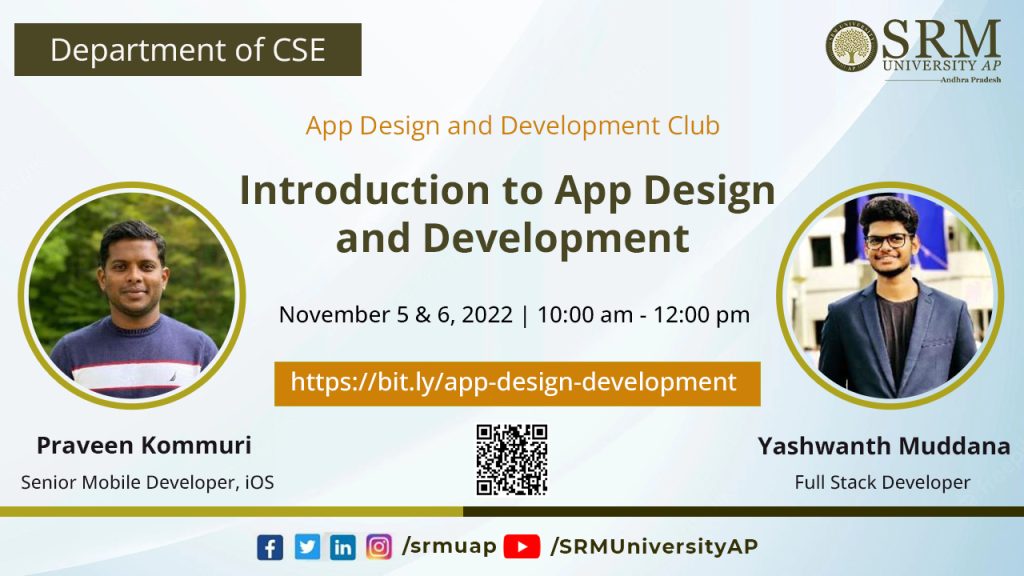
It is a prerequisite for technophiles to upskill their assets and sharpen their practical knowledge on tech operations and functions. The App Design and Development Club in association with the Department of Computer Science and Engineering is organising a workshop on the “Introduction to App Design and Development” on November 05 and 06, 2022 to help polish their tech savviness. Mr Praveen Kommuri, Senior Mobile Developer, iOS and Mr Yashwanth Muddana, Full Stack Developer will address the webinar.
About the speaker
Mr Praveen Kommuri has 11+ years of experience in iOS & amp; Mac application design and development. Currently, he is working as a Senior Mobile Developer, Senior Mobile Developer – iOS, Stanley Black & Decker, Inc., USA. Prior to this, he worked as a Senior Software Engineer at Way.com, Inc. USA from January 2017 to September 2021. Whilst in Way.com, he redesigned the Way app from scratch with brand new features. Being the lead, he has participated in UI discussions and implemented many UI and functional modules. He has taken data driven decisions based on Analytics data and implemented A/B Test on all new features. He improved app ratings from hundreds to 25k in a short time and collected valuable user feedback incorporated in the immediate releases. He worked as a consultant in Apple, Sunnyvale, California, USA where he worked on Apple’s internal iOS and Mac applications. He also served as a system analyst and system software engineer in QueST Global, Aspire Infolabs Pvt Ltd. Mr Praveen worked across multiple projects and threads. His creative thinking, expertise, and positive can-do attitude is awe inspiring. Mr Praveen’s strengths in pro-actively offering solutions and ideas, strong technical skill and being adept at all aspects of communications is an example for budding technophiles.
Mr Yashwanth Muddana is a Full Stack Developer who is passionate about solving the challenging problems with tech solutions. He has worked for many start-ups as a full-stack developer, mentored a web and app development club in the college and has done 10+ freelance projects. Mr Muddana is a React JS and React Native developer, UI/UX designer. He uses Node for the server and MySQL and MongoDB for the database. Besides that, he has experience on MEAN Stack, PHP, and many SDKS for analytics, Maps, Ads, Push Notifications and many more. He worked as a Software Developer, Zasket (Part Time) from September 2021 to May 2022. He has secured a job in Krypto Company with a CTC of 60 LPA and is also working on his own start up idea.
Join the webinar to improve your tech savvy!
Continue reading →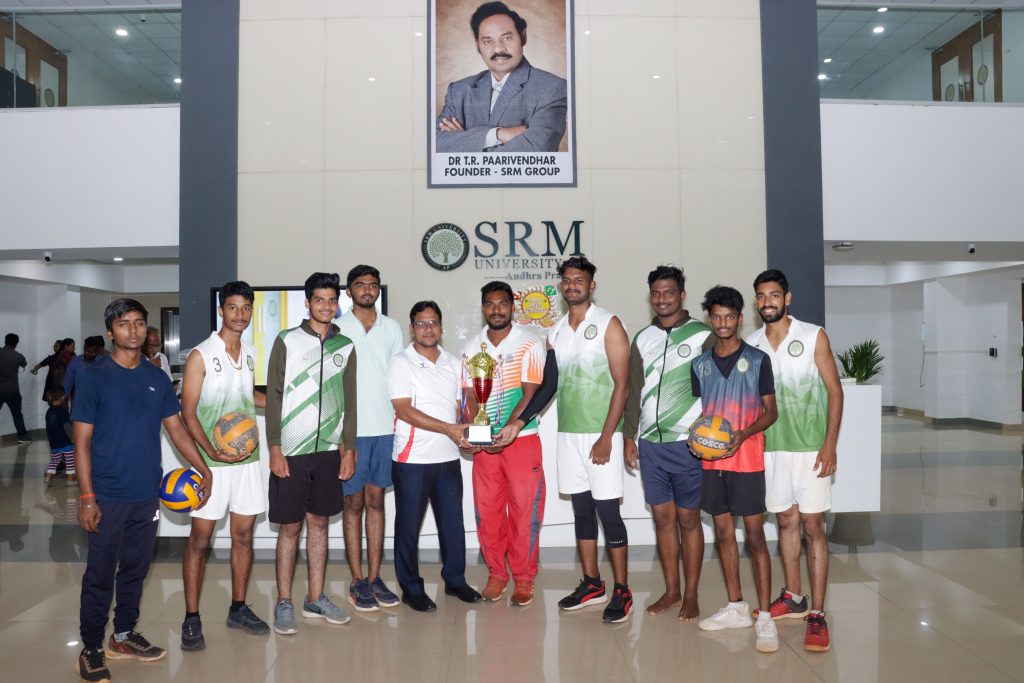 The joyful bliss when you reap the fruits of your labour and passion is immeasurable! The Directorate of Sports proudly congratulates the Men’s Volleyball team for bagging the Silver Medal in the Andhra Pradesh and Telangana State-level Institutional Volleyball Championship held at Khammam, Telangana. The league tournament was held from January 13 to 15, 2023 and was sponsored by Techwave India Ltd. The Volleyball team displayed a fantastic performance throughout the league and furnished a grand victory over the Khammam team in the semifinals by 3-2 sets. Dr Vijay Kumar Upadhyay, Ex-Ranji Player and Director of Sports, SRM AP was the Chief Guest of the Tournament.
The joyful bliss when you reap the fruits of your labour and passion is immeasurable! The Directorate of Sports proudly congratulates the Men’s Volleyball team for bagging the Silver Medal in the Andhra Pradesh and Telangana State-level Institutional Volleyball Championship held at Khammam, Telangana. The league tournament was held from January 13 to 15, 2023 and was sponsored by Techwave India Ltd. The Volleyball team displayed a fantastic performance throughout the league and furnished a grand victory over the Khammam team in the semifinals by 3-2 sets. Dr Vijay Kumar Upadhyay, Ex-Ranji Player and Director of Sports, SRM AP was the Chief Guest of the Tournament.
The team consisted of Captain – Ch Ganesh TVM Sai; Vice Captain – Ch Srinivas Rao and members N Gnana Sai Kiran, K Vivek, K Niranjan, K Bhardwaj, S Yeswanth, K Bhuvenesh, N Mahmood, K J N Venkat Sai, K Avinash, K Shri Harsha, K Balaji. They were accompanied by Coach – Tella Vamsi and Manager – Dr Abdul Mohimin.
SRM AP provides top-notch training and world-class facilities for students with potential, building them into national and international athletes. The university also celebrates the amalgamation of sports with academics improving the physical and mental constitution of the students. The university also recognises the need to provide aspiring athletes with opportunities to receive premier education. Hence the institute plans to include Sports and NCC Quota in the University Admissions in the upcoming year.
Continue reading → By Prof Y Siva Sankar
Professor of Practice, Department of Electronics and Communication Engineering
 Artificial intelligence, Machine learning, Robotics, IoT, 5G etc., are some of the technological innovations we hear about today. It is predicted that industry 4.0 will be dominated by these technologies and to have a career in industry we need to master them. At the heart of these new technologies is the evolution of the Semiconductor Industry. Semiconductor chips are incorporated in almost every electronic and communication product that enables these technologies for various domains. Military & defence, Automotive, consumer electronics etc. industries rely on these chips in their system design, while communication companies use semiconductors to improve their services. These industries rely on high-quality designs from qualified specialists to manufacture state-of-the-art equipment. Therefore, it’s essential that qualified specialists understand semiconductor design. That’s where an MTech in VLSI comes in handy. Basically, an MTech in VLSI is a two-year degree program that focuses on semiconductor design. During the study, we learn how to design and assemble circuits, chips, and other electronic components using silicon semiconductors. At the end of the degree program, students will be well-equipped to pursue a career as a designer or researcher in the field of VLSI. Since demand for MTech in VLSI is high these days, students can potentially gain lucrative employment after finishing the degree program. Additionally, this degree program prepares you for a career in any organisation that relies on silicon technology- including healthcare and research centres.
Artificial intelligence, Machine learning, Robotics, IoT, 5G etc., are some of the technological innovations we hear about today. It is predicted that industry 4.0 will be dominated by these technologies and to have a career in industry we need to master them. At the heart of these new technologies is the evolution of the Semiconductor Industry. Semiconductor chips are incorporated in almost every electronic and communication product that enables these technologies for various domains. Military & defence, Automotive, consumer electronics etc. industries rely on these chips in their system design, while communication companies use semiconductors to improve their services. These industries rely on high-quality designs from qualified specialists to manufacture state-of-the-art equipment. Therefore, it’s essential that qualified specialists understand semiconductor design. That’s where an MTech in VLSI comes in handy. Basically, an MTech in VLSI is a two-year degree program that focuses on semiconductor design. During the study, we learn how to design and assemble circuits, chips, and other electronic components using silicon semiconductors. At the end of the degree program, students will be well-equipped to pursue a career as a designer or researcher in the field of VLSI. Since demand for MTech in VLSI is high these days, students can potentially gain lucrative employment after finishing the degree program. Additionally, this degree program prepares you for a career in any organisation that relies on silicon technology- including healthcare and research centres.
Get an MTech in VLSI! Click here to apply
What is MTech in VLSI and How Can It Help You Achieve Professional Success?
MTech in VLSI (Very-Large-Scale Integration) is a postgraduate-level programme in the field of Electronics and Computer Engineering. The course focuses on the design and development of integrated circuits and systems, including computer-aided design (CAD) tools, simulation, and verification techniques.
The programme covers semiconductor device physics, IC fabrication technology, digital and analogue circuit design, computer-aided design tools, VLSI system design, digital and analogue circuit design, semiconductor device physics, and layout design. It also includes hands-on training in the use of VLSI design tools and the implementation of VLSI systems.
Completing an MTech in VLSI can help you achieve professional success by providing you with the knowledge and skills needed to design and develop advanced electronic systems. Graduates of the programme are well-suited for careers in VLSI design, embedded systems, semiconductor manufacturing, and computer-aided design. They are also well-prepared for further research in the field.
Graduates with this degree can work in roles such as VLSI design engineer, IC design manager, or VLSI research and development engineer. They can work in companies like Intel, Texas Instruments, and Samsung. Additionally, MTech in VLSI graduates can pursue research and teaching positions in universities and research institutions.
Are you interested in applying? You are just a click away!
What are the Prerequisites needed for Pursuing an MTech in VLSI?
The prerequisites for pursuing an MTech in VLSI typically include a bachelor’s degree in engineering or a related field, such as Electrical engineering, Computer engineering, or Electronics engineering. Some universities may also require a minimum GPA or a certain number of course credits in related subjects, such as circuit analysis, digital design, and semiconductor devices. To perform well in the course basic understanding of semiconductor physics and device operation, and familiarity with computer-aided design (CAD) tools and simulation software, such as SPICE, Verilog, and VHDL, is an advantage. Some institutions may also require a valid GATE or other entrance exam scores.
Exploring Different Career Paths after an MTech in VLSI
Overall, the career opportunities available to MTech in VLSI graduates are diverse and can be found in various industries, including electronics, computer hardware and software, telecommunications, aerospace, and more.
An MTech in VLSI can open a wide range of career opportunities in various fields such as:
- VLSI design: Graduates of the program can work as VLSI designers, developing integrated circuits and systems for various applications, such as computer processors, memory chips, and wireless communication devices.
- Embedded systems: Graduates can work in embedded systems, designing and developing intelligent devices and systems that include embedded processors, sensors, and communication interfaces.
- Semiconductor manufacturing: Graduates can work in semiconductor manufacturing companies, where they can be involved in the production of integrated circuits and other semiconductor devices.
- Computer-aided design: Graduates can work as CAD engineers, using computer-aided design tools to design and simulate integrated circuits and systems.
- Research and Development: Graduates can also opt for research and development in VLSI, working in universities, research institutions, or private companies, to conduct cutting-edge research in areas such as nano-electronics, low-power VLSI, and more.
Some of the common career paths for graduates of the programme include:
- VLSI Design Engineer: These professionals work on the design and development of integrated circuits and systems using computer-aided design (CAD) tools and simulation techniques. They may work in industries such as semiconductor manufacturing, telecommunications, and consumer electronics.
- Embedded Systems Engineer: These professionals design and develop embedded systems, which are computer systems integrated into other devices and products. They may work in industries such as automotive, aerospace, and consumer electronics.
- Semiconductor Manufacturing Engineer: These professionals work in the manufacturing and producing of semiconductor devices, such as transistors, diodes, and integrated circuits. They may work in industries such as semiconductor manufacturing, telecommunications, and consumer electronics.
- Computer-Aided Design Engineer: These professionals work on the development and use of computer-aided design (CAD) tools for the design and simulation of electronic systems. They may work in industries such as semiconductor manufacturing, telecommunications, and consumer electronics.
The Benefits of Pursuing an MTech in VLSI Design & Technology
Pursuing an MTech degree in VLSI Design & Technology can provide several benefits, including:
- Advanced Knowledge: The programme provides a deep understanding of VLSI design methodologies, digital and analogue circuit design, semiconductor device physics, and layout design, which is essential for developing integrated circuits and systems.
- Hands-on Experience: The programme provides hands-on training in the use of VLSI design tools and the implementation of VLSI systems, which can help graduates gain valuable practical experience in the field.
- Career Advancement: An MTech in VLSI and Embedded systems can help graduates advance their careers in VLSI design and technology, or related fields such as embedded systems or semiconductor manufacturing.
- Specialization: The programme is specialised and provides the opportunity to gain expertise in a specific area of VLSI design and technology, which can be an advantage in the job market.
- Networking: The programme can provide opportunities to network with other professionals in the field, including faculty members and fellow students. This can be valuable for building professional relationships and staying informed about the latest developments in the field.
- Research Opportunities: An MTech in VLSI and Embedded systems can provide students with the opportunity to conduct research in the field, which can lead to discoveries and advancements.
- Higher Pay: The graduates with MTech in VLSI usually get higher pay than the undergraduate engineers.
- Higher positions: MTech degree holders are often considered for higher-level positions, such as project managers, research and development managers, or senior engineers.
Enhance your career prospects in VLSI. Apply now for your MTech degree!
Advantages of pursuing an MTech Degree in VLSI at SRM University-AP
SRM University-AP (Andhra Pradesh) is one of the premier institutes in India for education and research in the field of VLSI Design & Technology. Pursuing an MTech degree in VLSI at SRM University-AP can provide several advantages, including:
- Faculty: The university has a team of highly qualified and experienced faculty members who are experts in VLSI design and technology.
- Research-oriented curriculum: The programme has a research-oriented curriculum, which provides students with opportunities to conduct research and work on projects under the guidance of faculty members.
- State-of-the-art facilities: SRM University-AP has state-of-the-art facilities, including labs and research centres, which are well-equipped with the latest equipment and software needed for VLSI design and technology.
- Industry Connections: The University has strong industry connections, which can provide students with opportunities for internships and placements in leading companies.
- Entrepreneurship: The University has a strong focus on entrepreneurship, which can provide students with the opportunity to develop their business ideas and turn them into successful ventures.
- International Exposure: SRM University-AP collaborates with international universities and research institutes, which can provide students with opportunities for international study and research.
- Strong Alumni Network: The University has a strong alumni network, which can be valuable for networking and professional development.
- Reputation: SRM University-AP is known for its reputation for providing high-quality education and research in the field of VLSI and Embedded systems, which can benefit graduates in terms of employability and career opportunities.
- Scholarship: All the students who get admission to the course will be given up to 100% scholarship to cover the tuition fees.
- Stipend: All the students who get admission to the course will get a stipend of Rs. 6000 per month.
Apply now for your MTech degree!
Continue reading →



